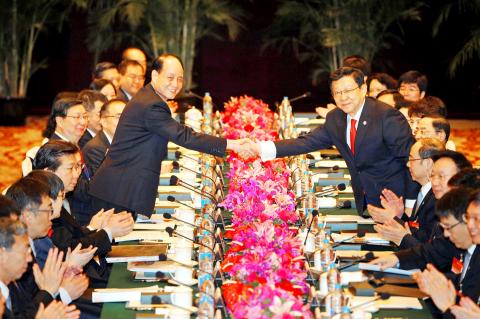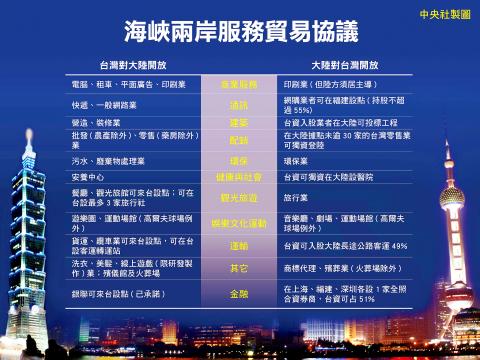The Straits Exchange Foundation and the Association for Relations Across the Taiwan Straits (ARATS) yesterday signed a cross-strait service trade agreement in Shanghai during the ninth round of cross-strait talks, opening the service sectors on both sides to further cross-strait exchanges.
Under the pact, which includes four chapters and 24 articles, 64 Taiwanese industries will be opened to Chinese investment, while China will open up 80 industries to Taiwan.
The Taiwanese industries include transportation, tourism and traditional Chinese medicine, while China will open up its finance, retail, electronics, publishing and travel sectors.

Photo: CNA
Under the agreement, Chinese investors will be allowed to open hotels in Taiwan.
Taiwan will also allow Chinese travel agencies to establish a maximum of three branches in the country and provide services to Taiwanese. However, they will not be allowed to accommodate any foreign tourists, including Chinese.
Taiwanese investors will be allowed to set up travel agencies in China, as well as open restaurants or hotels.

Photo: CNA
Chinese companies will be allowed to open beauty parlors or hair salons in Taiwan, but would only be allowed to employ Taiwanese.
While China will open its publishing industry to Taiwanese investment, Taiwan will allow Chinese companies to invest in Taiwanese businesses in the printing service industry, with a maximum of 50 percent stock ownership.
On financial services, Taiwanese companies will be allowed to invest security companies in Shanghai, in Shenzhen and Chinese-controlled Fujian Province.
In signing the pact, foundation Chairman Lin Join-sane (林中森) and ARATS Chairman Chen Deming (陳德銘) both lauded the agreement for deepening cross-strait exchanges in the service sector.
Lin said 80 percent of the deal opens the two sides’ service sectors to the same or greater degree as the Closer Economic Partnership Arrangement (CEPA) that was signed between Hong Kong and China in 2003, with 90 percent of financial services covered in the cross-strait agreement opened, just like in the CEPA.
The cross-strait service trade agreement is a major follow-up to the Economic Cooperation Framework Agreement (ECFA) and the General Agreement on Trade in Services under the WTO.
“The service trade agreement is a pact that benefits related sectors across the Taiwan Strait and promotes the interests of the public on both sides. It will result in a win-win situation for both sides,” Lin said.
After signing the pact, Taiwan and China cannot revise or cancel the agreement within the next three years.
The two sides will hold an annual meeting to review the implementation of the pact.
The agreement also includes an emergency negotiation mechanism, which gives related industries from each side the right to demand negotiations and seek solutions if the agreement negatively affects their businesses sectors.

CHAOS: Iranians took to the streets playing celebratory music after reports of Khamenei’s death on Saturday, while mourners also gathered in Tehran yesterday Iranian Supreme Leader Ayatollah Ali Khamenei was killed in a major attack on Iran launched by Israel and the US, throwing the future of the Islamic republic into doubt and raising the risk of regional instability. Iranian state television and the state-run IRNA news agency announced the 86-year-old’s death early yesterday. US President Donald Trump said it gave Iranians their “greatest chance” to “take back” their country. The announcements came after a joint US and Israeli aerial bombardment that targeted Iranian military and governmental sites. Trump said the “heavy and pinpoint bombing” would continue through the week or as long

TRUST: The KMT said it respected the US’ timing and considerations, and hoped it would continue to honor its commitments to helping Taiwan bolster its defenses and deterrence US President Donald Trump is delaying a multibillion-dollar arms sale to Taiwan to ensure his visit to Beijing is successful, a New York Times report said. The weapons sales package has stalled in the US Department of State, the report said, citing US officials it did not identify. The White House has told agencies not to push forward ahead of Trump’s meeting with Chinese President Xi Jinping (習近平), it said. The two last month held a phone call to discuss trade and geopolitical flashpoints ahead of the summit. Xi raised the Taiwan issue and urged the US to handle arms sales to

State-run CPC Corp, Taiwan (CPC, 台灣中油) yesterday said that it had confirmed on Saturday night with its liquefied natural gas (LNG) and crude oil suppliers that shipments are proceeding as scheduled and that domestic supplies remain unaffected. The CPC yesterday announced the gasoline and diesel prices will rise by NT$0.2 and NT$0.4 per liter, respectively, starting Monday, citing Middle East tensions and blizzards in the eastern United States. CPC also iterated it has been reducing the proportion of crude oil imports from the Middle East and diversifying its supply sources in the past few years in response to geopolitical risks, expanding

OTHER OPTIONS: Given possible US intervention and Taiwanese counterattacks, China might opt to blockade Taiwan or take its outlying islands instead of an all-out invasion A US think tank has urged Taiwan to adopt a “hellscape” strategy that would flood the Taiwan Strait with drones and other uncrewed systems to deter invasion by China. In its report, Hellscape for Taiwan, published on Thursday, the Center for a New American Security said Taipei’s asymmetric defense approach — often described as a “porcupine strategy” — needs to evolve to keep pace with the growing capabilities of the Chinese People’s Liberation Army. The “hellscape” strategy involves saturating the air and waters around Taiwan with thousands of drones and other platforms capable of striking invading forces from multiple domains at once. Long-range